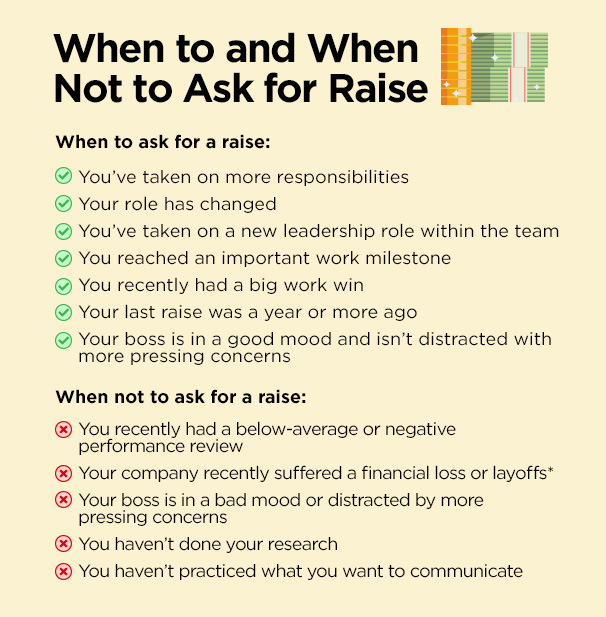Updated March 27, 2023
How much control do you have over your salary? More than you might think. A recent PayScale Inc. survey found that 70% of workers who ask for a raise get some sort of increase. Among those who asked for a raise, 39% got the amount they requested, while 31% received a smaller increase.
Nail the Timing: When To Ask for Raise
Raises are typically offered by the employer to mark important work milestones or as part of a positive performance review, but it’s OK to take a proactive stance in asking for one if you think it is deserved or overdue.
You’ve Taken On More Responsibilities
If your role is expanding and you are doing more than you have in the past, asking for a pay raise is a natural next step. Your salary should reflect the work that you do and the value you bring to the company.
Your Role Has Changed
If your role has changed or evolved over time, it might be time to reevaluate your title and salary. This might include doing more high-value or high-earning work for the company or taking on a leadership role that has you overseeing the work of others.
You’ve Just Had A Big Work Win
The completion of a successful project can be a great time to ask. If you can, gather information that quantifies the value you added to the project or the company. You’ll want to time the request so that your accomplishments are fresh in the mind of your boss.

*If your company recently downsized, and as a result of layoffs, you were asked to take on significantly more responsibility, you might be justified in asking for compensation that reflects the slack that you are picking up.
Do Your Research And Be Ready With Numbers
It’s helpful to know what others in your industry are being paid for similar work at similarly sized companies. Have some salary range numbers in mind including the percentage increase you are hoping for, so you can proactively lead the discussion. It will also show your boss that you are informed. Salary data is gathered and is available on sites like Glassdoor and Indeed, among others.
Consider that:
- The average annual raise in the US is 7.6% as of 2022.
- The average salary increase when changing jobs is 14.8%, while wage growth is 5.8% for those who remain at their job.
You can crunch the numbers using a pay raise calculator.
Focus On How You’ve Earned It, Rather Than Why You Need It
You might need the money for something specific, but your boss doesn’t need to know that. Instead, focus on why you deserve the raise by highlighting the positive impact you bring to the company. While being honest about our personal lives doesn’t have to be taboo in the workplace, specific details are out of place in salary negotiations.
Why? You don’t want your boss to feel undue pressure to give you a raise for reasons other than the quality of your work and how you have positively impacted the company.
Practice What You Want to Communicate
Yes, really. Rehearsing what you want to say isn’t about memorizing a word-for-word script. Instead, it’s about getting comfortable with what you want to communicate so that it will be natural and second nature when it’s go time.
Check Your Company Policy
Your company may have guidelines written into its handbook governing salary increases. Be sure to research this thoroughly before asking. There is no point in asking your boss for a raise if the handbook won’t allow them to give it to you. If there are extraordinary circumstances at play, consider reaching out to HR ahead of time to address the policy.
Know The Risks
An employer shouldn’t fire you for asking for a pay raise, but if you work in an “at-will” state, they certainly can. That isn’t likely to happen in healthy work environments, but if your boss or workplace is toxic, it is certainly possible. If you worry about retaliation for asking for a pay raise, it might be time to start quietly looking for a new job.
Increase Your Chances By Building a Strong Reputation
In addition to planning ahead for your pay raise, it’s a good idea to make sure that you are working every day toward core values that could improve your chances of success. Having a positive attitude, and being a well-liked member of your team are great ways to build your reputation.
- A Positive Attitude
- Taking Initiative and Ownership
- Going Above and Beyond
- Being a Team Player
- Thinking Before you Speak
- Accepting Criticism with Confidence and Poise
- Professional Polish
- Being Solutions Oriented
Avoid These Mistakes You Might Not Have Considered:
- Apologizing to much
- Talking about what someone else earns
- Comparing yourself to others on your team
- Offering an ultimatum or threatening to quit
- Complaining about your workload
Be Ready To Accept A “No” With Poise
While being turned down for pay raise is disappointing, try not to think of it as a failure. In reality, a “no” usually means “not right now.” You can ask to revisit the request when the timing is better or during a traditional milestone like a work anniversary or performance review. If your boss doesn’t mention it, be sure to clarify when you can follow up on the request in the future.
